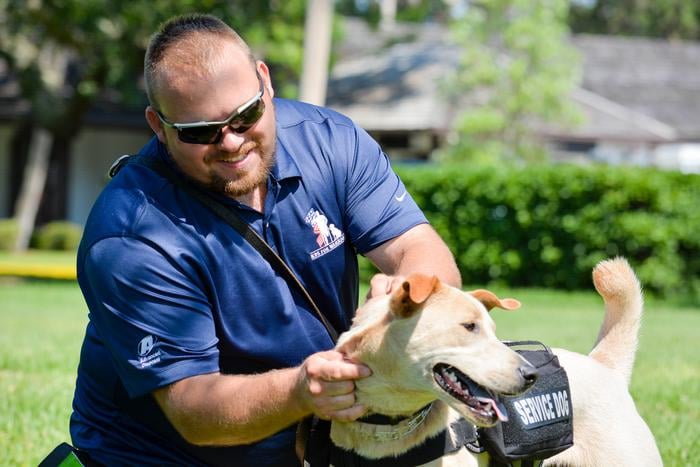Service dogs can significantly improve the lives of veterans struggling with post-traumatic stress disorder (PTSD), according to a new study by researchers at the University of Arizona College of Veterinary Medicine. The study, published in the medical journal JAMA Network Open, found that veterans who worked with service dogs experienced lower PTSD symptom severity, reduced anxiety and depression, a higher quality of life, and fewer feelings of isolation compared to a control group.
For retired Command Sgt. Maj. Gretchen Evans, who served in the United States Army for 27 years, a service dog named Aura provided much-needed relief after a rocket blast in Afghanistan left her with near-total hearing loss, a traumatic brain injury, and PTSD. “As soon as I got Aura and had her by my side, that really took away the fear of engaging with people and day-to-day life,” Evans said. “I didn’t feel like a Deaf person anymore. I had working ears; they just so happened to have four legs and black fur. Aura opened so many doors and gave me my confidence back. And I was never lonely, because those dogs are your best battle buddy in the world.”
Challenges in Accessing Service Dog Intervention
Despite the well-documented benefits of service dogs for veterans with PTSD, there is a lack of empirical research on the use of these animals as a medical intervention. This lack of data leads to a series of challenges for veterans seeking treatment, including limited funding for service dog nonprofits, medical insurance companies that do not fund service dog intervention, and legislative gaps in protecting the civil rights of people with disabilities partnered with service dogs.
Lead study author Sarah Leighton, a graduate student studying psychology and a member of the OHAIRE research group in the College of Veterinary Medicine, emphasized the importance of identifying complementary interventions to support veterans with PTSD and improve their outcomes. “We know that veterans with PTSD are struggling,” Leighton said. “Rates of death by suicide among veterans with PTSD are about one-and-a half times higher than civilian adults, and they also have very high rates of other conditions like depression and anxiety.”
Future Research on Service Dogs and PTSD Treatment
While the study supports the effectiveness of service dogs in reducing PTSD symptoms, the researchers acknowledge that more work must be done to better understand how working with a service dog impacts other treatments for PTSD. The OHAIRE group is developing a clinical trial to analyze how service dogs impact the effectiveness of prolonged exposure therapy, a “gold-standard” therapy recommended for treating PTSD.
The researchers hope to discover if working with a service dog during therapy leads to fewer trauma symptoms, less severe PTSD, reduced suicidal thinking, better biological, physiological, and social well-being, and an easier time completing prolonged exposure therapy. Principal investigator Maggie O’Haire, College of Veterinary Medicine associate dean of research and professor, and founder of the OHAIRE group, emphasized the importance of this research, stating, “Veterans have told us directly that our research is changing their lives for the better. Service dog partnerships deserve to be researched, and our findings will help increase access for people who could benefit.”
As the study continues to shed light on the potential of service dogs as a complementary medical intervention for veterans with PTSD, it is clear that these four-legged companions can play a significant role in improving the lives of those who have served their country.
If our reporting has informed or inspired you, please consider making a donation. Every contribution, no matter the size, empowers us to continue delivering accurate, engaging, and trustworthy science and medical news. Independent journalism requires time, effort, and resources—your support ensures we can keep uncovering the stories that matter most to you.
Join us in making knowledge accessible and impactful. Thank you for standing with us!

